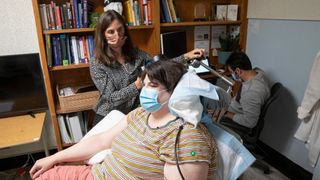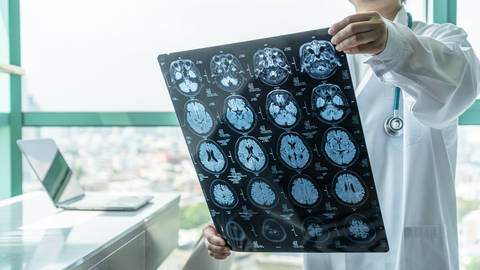Depression Distraction
"I couldn't stop crying. The thought that consumed me the entire way on that road was just driving my car into the marshland so I can drown.""Within a few weeks, the suicidal thoughts just disappeared.""[I am now] seeing things that are beautiful in the world, and when I was in the depths of depresions, all I saw was what was ugly."Sarah, 38, (last name withheld), California"One person's depression might look very different from another person's depression."Dr.Katherine Scangos, assistant professor of psychiatry, U.C.S.F.
 |
Sarah was put through the wringer in a sense in a desperate attempt to find a therapy or a drug that would help manage her bouts of deep depression; treatments, medications, hospital day program, electroconvulsive therapy, transcranial magnetic stimulation. Nothing worked for her. But it's not just her experience in actual fact; close to a third of the 230 million people living with depression worldwide echo her experience of persistent symptoms despite searching out a working solution.
And then something new came her way through researchers at the University of California, San Francisco when a battery-powered matchbook-sized device was implanted in Sarah's brain, and calibrated to detect neural activity patterns occurring when she is becoming depressed. Her "pacemaker for the brain" responds by delivering pulses of electrical stimulation meant to pause the depression.
What Sarah and the UCSF researchers have embarked on is a personalized technique with a treatment known as deep brain stimulation; its purpose, to treat depression. The researchers make it clear that additional research is required before it is fully understood how effective this approach may be and to be able to gauge which patients would benefit from it. Parkinson's disease along with several other disorders use deep brain stimulation as a treatment.
The U.S. regulators have not approved the treatment for depression since results have been inconsistent, including two trials brought to a halt when it was realized that the technique appeared to have no benefits to patients making it superior to a placebo. What is different about the technique personalized for this test subject is the individualized locations targeted leading to patterns of electrical activity in people's brains.
The "one size fits all" application -- as Dr.Darin Dougherty, director of neurotherapeutics at Massachusetts General Hospital -- was unsuccessful, he pointed out from his perspective of having been involved in one of the cancelled trials. Typically, deep brain stimulation is delivered continuously, while the device planted in Sarah's brain supplies a six-second burst when depression-linked brain activity becomes assertive. Dr.Dougherty explained that the stimulation is meant to disrupt or shift the neural activity, producing a healthier pattern easing symptoms of depression.
Along with the implant, continuation of psychiatric medications has not entirely succeeded in eliminating depression-causing activity, but in the same token Sarah now can manage her illness in an improved atmosphere; asserting her personal agency for routine decision-making where previously uncertainty assailed her.
Standard treatments for depression sees some 30 percent of those afflicted unresponsive, or the side effects are intolerable to them. Deep brain stimulation, although promising, has a high cost attached to it, making it unavailable to many depression sufferers since it comes with a cost of thousands of dollars and the surgical implantation can carry infection risks,
"Our job now is really o figure out what it is that identifies who needs this kind of involvement", explained Dr. Helen Mayberg of the Icahn School of Medicine, New York City. The number of times a day over a period of a year that Sarah's device detects depression-linked activity, delivering stimulation, has decreased somewhat. Sarah is unable to feel the finely tuned stimulation but believes she can detect its occurrence since she develops "emotional distance" that keeps negative feelings "compartmentalized".
 |
| A small device implanted in the brain of a patient with severe, treatment-resistant depression was trained to issue electrical pulses to areas of the brain linked to the condition. The effects of the neurostimulation kicked in almost immediately, according to a new study from UCSF Health. (Getty Images/Chinnapong) |
Labels: Brain Implant, Clinical Depression, Deep Brain Stimulation, Research

0 Comments:
Post a Comment
<< Home